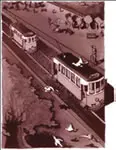The tree and the electric car

Once upon a time there was a tree with large, leafy branches that had lived in a garden for many years. Underneath were old men talking, sunbathing or playing cards.
In front, back and forth, several times a day, passed a pawn and yellow tram. It brought people, it carried people, it squealed on the rails as it turned around before stopping at the edge of the garden.
Where would it go? Where would it come from? What squares and streets would you cross? The tree was looking at the tram and wondering how good it would be to jump into the stirrup, buy a ticket and get out there, get to know the city, the river, the people who were in a hurry to get to work or home, the boys. in a hurry to get everywhere, boyfriends in a hurry to get nowhere.
The tree dreamed of colorful nooks, streets overflowing with music, squares full of clowns and balancing, impossible trips. But he could not leave his garden. She was clinging to her roots and the old ones who, in their broad shadow, came to rest their bones every day.
Many times the tree had tried to stretch the branches and get close to the tram. But in vain. The trees are attached to the ground. They were not born to be astronauts or poets. Or rather, his poetry is vegetal and is forever rooted in the heart of the earth.
She, however, insisted. He had asked the wind to tilt it and make its branches touch even slightly on the tram wheels. As much as it blew, the wind had no power to do so.
He had asked autumn that when he took the already brown leaves he would let them in through the tram windows. But the leaves fell straight to the ground and danced in a great whirlwind until the first rains came that made them fulfill their destiny to return to the womb of the earth.
The tree grew sad, crunchy, with no interest in life, almost without feeling the force of the sap that ran insisting on keeping it upright.
The birds that nested in its branches, seeing her so down, decided to help her. They left in every direction, following all the trams and trying to know where they come from, where they are going, which squares they cross, who they take them to, where they sleep.
Every day the birds depart and return with countless stories, landscapes and adventures to tell the eager tree that awaits them at sunset.
Until night falls, the chirping does not stop. This is the sweetest time of day for this tree. The time when you feel wiser and happier and traveled. José Fanha The night when the night did not come Porto, Campo das Letras, 2001



